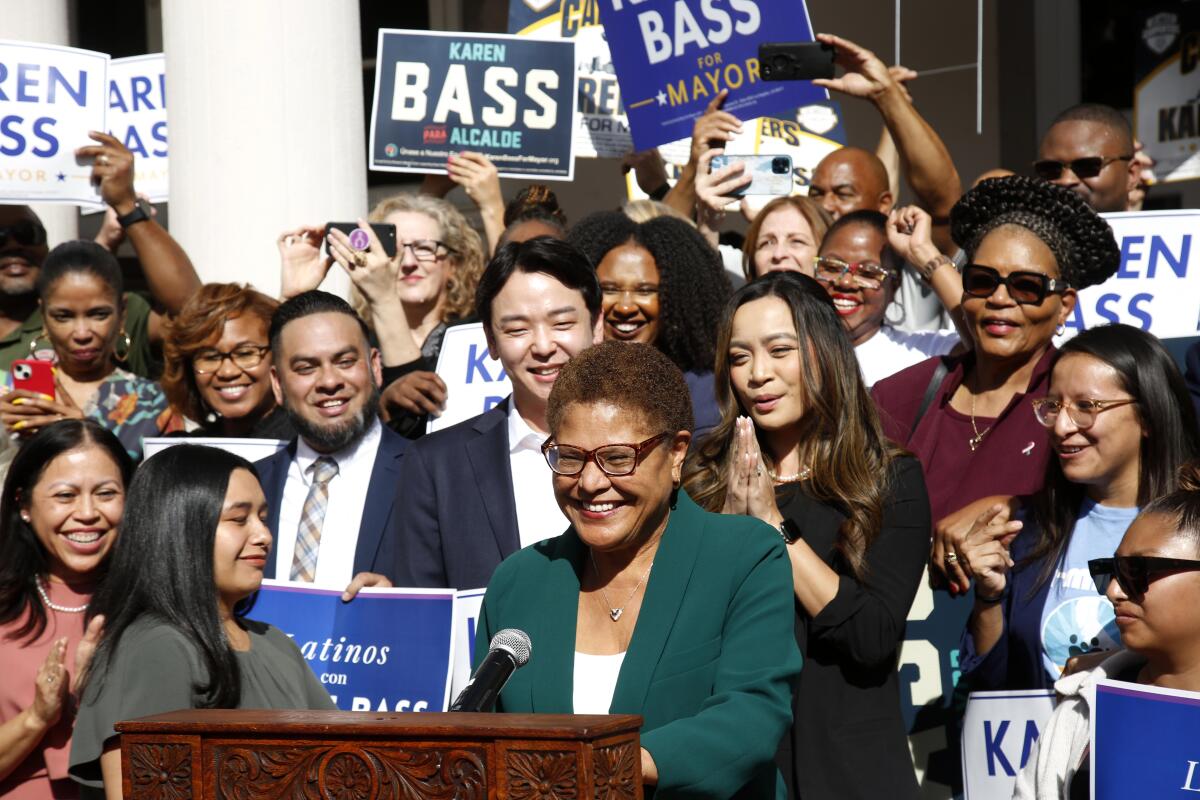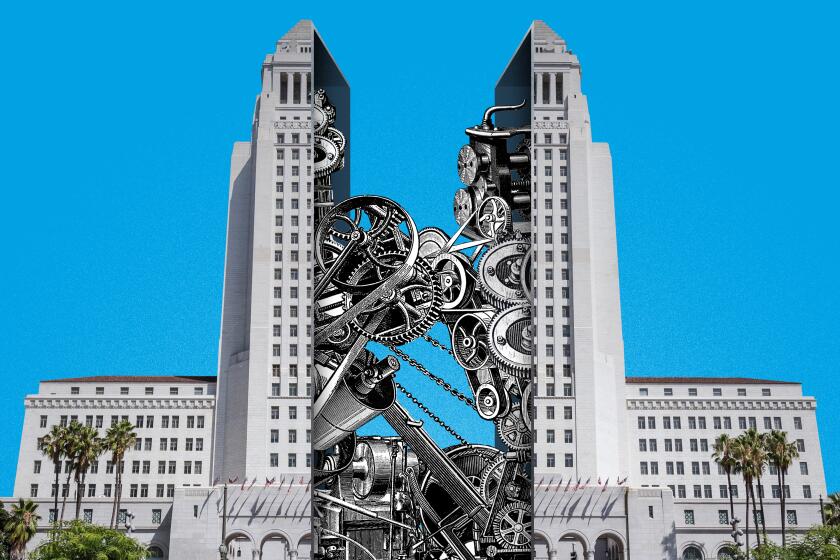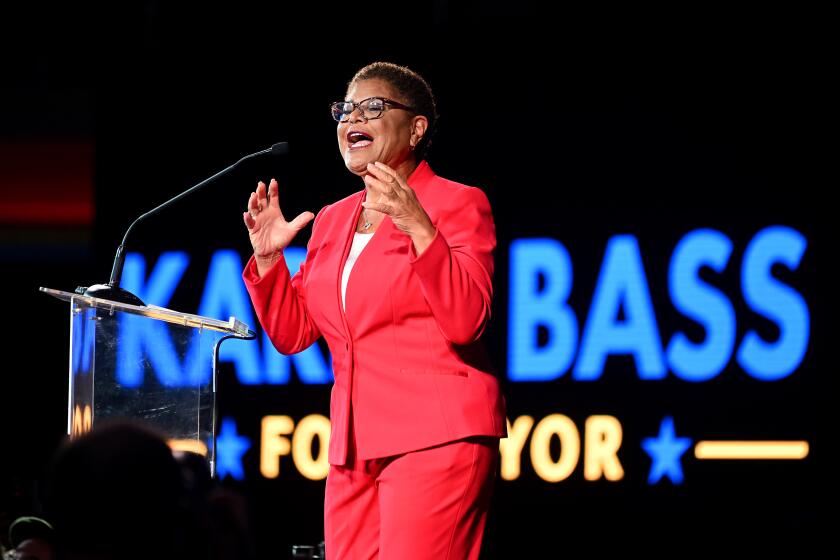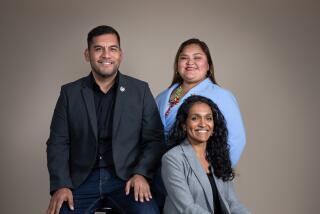Editorial: L.A.’s new leaders have a mandate to change City Hall

Rarely has Los Angeles seen so much change at City Hall at once. Nearly half of L.A.’s elected leaders will be newly sworn in as of this week. And these leaders are not just new to their positions; seven of the eight incoming elected officials are newcomers to city government.
If voters wanted to shake things up and get fresh faces into local government, they succeeded. Mayor Karen Bass, City Atty. Hydee Feldstein-Soto and City Controller Kenneth Mejia have never worked for the city. Nor have Councilmembers Eunisses Hernandez, Katy Young Yaroslavsky, Traci Park and Hugo Soto-Martinez.
Of all the newly elected, only Councilmember Tim McOsker has firsthand experience serving in L.A. government, including working as former Mayor James Hahn’s chief of staff.
Los Angeles City Hall has been rocked by scandal after scandal, but now there’s momentum to reform city government.
These new leaders have wildly different ideas and experiences. Among them are activists, a union organizer, lawyers, a lobbyist and policy wonks. Several lean hard left and have very different views on social, environmental and criminal justice policies than have been the norm in City Hall, which has been more moderate. The diversity is a break from the recent past when most of the city’s elected leaders rose up through the ranks in City Hall or served in the state Legislature and tended to be more centrist — and it makes it harder to predict how these new leaders will govern and whether they will be able to work well together.
The new class arrives at a critical moment for Los Angeles. City Hall has been rocked by scandals, including multiple council members indicted for corruption and a leaked audio recording of three council members making racist and divisive comments about their colleagues and constituents. There’s deep dissatisfaction among Angelenos with the lack of progress in easing the homelessness crisis after voters approved Measure HHH in 2016 committing the city to spend $1.2 billion to build supportive housing.
There’s a lot of hope and optimism that the turnover in City Hall is an inflection point, when L.A. moves beyond the scandals and infighting and gets to the business of governing. And there are high expectations. Voters were promised results: more homeless people housed (Bass said she’d find interim housing or permanent housing for 17,000 people in her first year), more affordable housing built faster, more mental health workers to help people in crisis, safer neighborhoods, fewer evictions and greater transparency into city operations.
Bass will take the helm of a city in desperate need of leadership. She will need to quickly show residents that she’s in charge and ready to make change.
Now the hard work begins. This was an election of change, and these newbies have the responsibility to make things happen within a deeply entrenched bureaucracy, in a city where residents are clamoring for leaders to fix the big problems but divided over how to do it.
There’s no bigger problem than the city’s homelessness and housing crisis. City leaders can start by unwinding byzantine development and funding regulations to make it faster, easier and cheaper to build homeless and affordable housing. There will be tension over the details of how to expedite housing production, including when to relax height, density and parking requirements, reduce or eliminate public hearings and block project appeals. And expect fights among city leaders and in communities over loosening restrictions on market-rate housing and allowing multifamily housing in single-family neighborhoods; despite the need for more housing, there is still no consensus on how L.A. should grow.
The good news is that, at least among elected leaders, there is near-universal support for streamlining affordable housing and homeless housing development. The passage of Measure ULA on Nov. 8 will help pay for that housing by generating hundreds of millions of dollars a year with a tax on real estate sales over $5 million.
Likewise, there is broad agreement that Los Angeles should transfer some responsibilities from police to social workers and mental health experts, including homeless outreach and nonviolent mental crisis intervention. But there is less agreement over whether that should result in a reduction in police officers and whether the police budget should be cut to help fund a new alternative response system. Bass wants to maintain the authorized size of the LAPD force. Some new council members are expected to push for a larger force while other new city leaders will make the case for spending less on the Police Department and more on social services, including public health, housing and youth programs.
There’s nothing wrong with difficult debates — these are hard issues to solve, but making progress is crucial for the future of the city and its residents. L.A.’s new leaders and the incumbents have a mandate for change, and we’re hopeful they can deliver.
More to Read
A cure for the common opinion
Get thought-provoking perspectives with our weekly newsletter.
You may occasionally receive promotional content from the Los Angeles Times.












